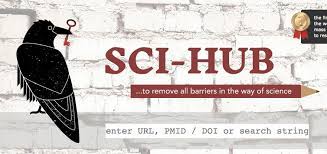The Fix Isn't In
By now, you’ve probably heard of Sci-Hub, a collection of millions of articles being gathered through borrowed or stolen library logins, then loaded onto servers abroad for anyone to download. The woman who started it has been called a modern-day Robin Hood. Also, a criminal. There has also been heated debate about why librarians aren’t doing more to back publishers in this fight. After all, these thieves are taking advantage of licensed scholarship that costs libraries billions of dollars annually! Surely we want to stop this rampant theft!
 To which I’m tempted to respond “when did we sign on to become your guards, and when do we get a check for this labor?” Because it is labor – lots of labor – to maintain link resolvers, keep license agreements in order, and deal with constant changes in subscription contents. We have to work a lot harder to be publishers’ border guards than people realize. While this runs completely counter to our values, we really have no choice but to provide this free labor. Libraries run the risk of having their institutional access cut off if a publisher finds their institutional IP address is involved in a massive download. More troubling is the fact that stolen or leaked credentials can seriously compromise both network and individual security.
To which I’m tempted to respond “when did we sign on to become your guards, and when do we get a check for this labor?” Because it is labor – lots of labor – to maintain link resolvers, keep license agreements in order, and deal with constant changes in subscription contents. We have to work a lot harder to be publishers’ border guards than people realize. While this runs completely counter to our values, we really have no choice but to provide this free labor. Libraries run the risk of having their institutional access cut off if a publisher finds their institutional IP address is involved in a massive download. More troubling is the fact that stolen or leaked credentials can seriously compromise both network and individual security.
In other words, whatever you think of Sci-Hub, it’s not the fix for the mess we’re in. So why are scholars using Sci-Hub? I can think of a couple of reasons: they may have no other access to these articles, not being affiliated with a well-funded first world library (the Robin Hood version) or because getting access is a hassle and hey, I need those articles! Give me those articles right now! For many folks, Sci-Hub is simply a more convenient library that doesn’t make you mess around with logins and interlibrary loans. Hey, we’re busy. Paywalls are a pain...
- Tags:
- academic book publishing
- academic journal license agreements
- Barbara Fister
- black market for articles
- constant changes in subscription contents
- Elsevier
- free access to research papers
- high annual rent
- interlibrary loans
- John Dupuis
- Kevin Smith
- lack of open access
- open access (OA)
- open access publishing for all academic work
- paywalls
- publishers publication guards
- Sci-Hub
- soul-destroying for librarians
- The Library Loon
- well-funded Western library
- Login to post comments